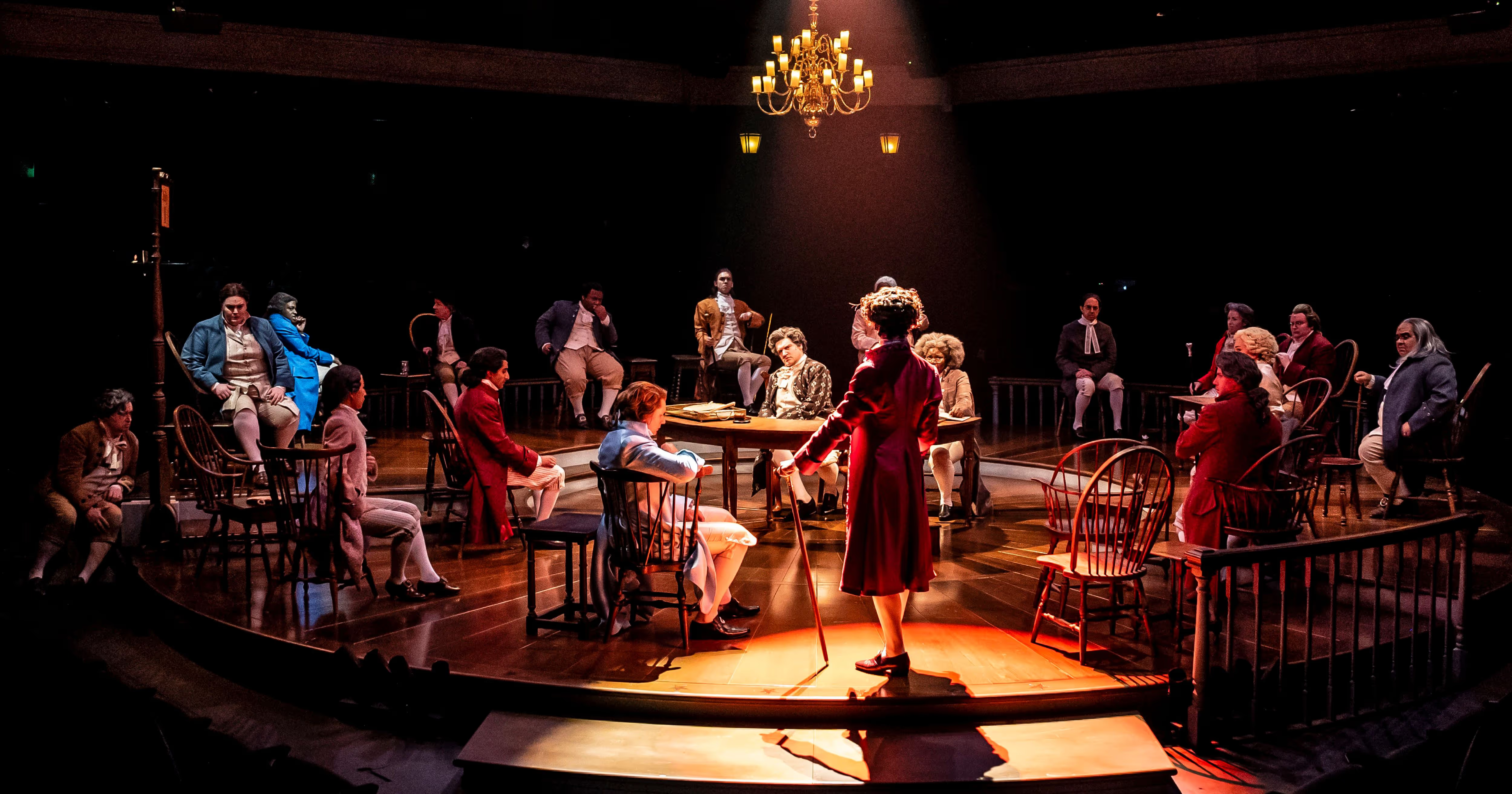'1776’ at Marriott Theatre rediscovers the hope in the birth of America
“America’s Prize-Winning Musical,” says the Marriott Theatre’s marquee. Staring up Wednesday night in Lincolnshire, I mused as to which prizes were honorably gained.
Democracy? Freedom? Equality of opportunity? Tony Awards?
All of the above, you might say.
I suspect “1776,” the hit 1969 Broadway musical with music and lyrics by Sherman Edwards and a book by Peter Stone, was picked with an eye for this political season. Fair enough. This is the story of the chaotic negotiations that led to the eventual signing of the Declaration of Independence.
The show takes the point of view of John Adams (here, Tyrick Wiltez Jones), the Founding Father who went on to become vice president and then the second president of the nation he helped conceive. In this telling, Benjamin Franklin (Richard R. Henry) becomes a kind of semi-mystical second banana to Adams’ alpha male, with Thomas Jefferson (Erik Hellman) the wonkish if poetic scribe who elucidated and codified the vision for America.
But the show, which has never left the repertoire in the 55 years since its creation, also derives narrative tension from the question as to whether Congress will get enough agreement, and be willing to make sufficient internal compromises, to actually get this job of birthing America done.
That’s where “1776” most obviously presents problems for a contemporary production, since what you had here was a bunch of generally wealthy white guys (albeit young, not old), agreeing to compromise on slavery to get the support of the Deep South and ensure their dream of a new nation. Back in the day, you’d walk out of “1776” having had a warm-centered, patriotic lesson in pragmatic negotiation. This friendly and idealistic congressional dealmaking came with women playing only a supportive role and slavery presented not so very much differently as the numerous other amendments, friendly and otherwise, proposed to Jefferson, who bows his head and accepts most of them as, well, the price of doing political business. So “1776” became one of those musicals that audiences still wanted to see rather more than most artists, especially artists of color, wanted to do. And with the original creators deceased, it was pretty much etched in ink.
In 2022, the directors Diane Paulus and Jeffrey Page attempted a Broadway revival for the fraught moment, even with a fractious cast that (in at least one case) called the material “a relic.” There were some fascinating ideas and performances but the production had so much anger it was simply incapable of capturing the optimism baked into the material. Which begged the question as to why bother, as distinct from trying something new.
Time has marched on again and more of a sense of hope now is in the air, so perhaps good old “1776” will come back into vogue. The Democratic National Convention certainly embraced patriotism very differently from how Democrats saw the world in 2020. In essence, director Nick Bowling’s Marriott Theatre production does away with the bunch-of-white-guys issue by embracing a racially diverse cast that’s by no means all male. That’s the only way to do this large-cast show these days, in my view.
He then lets these capable performers do their jobs, and allows the show to work its proven artistry without undermining its essential belief in the possibilities of the nation whose birth the show describes. Unlike most classic musicals of its era, “1776” has a very hefty and static book and many minutes between its songs. But when they finally arrive, many of those numbers (“Molasses to Rum,” “He Plays the Violin”) are classics of the genre and they sound splendid here. If you are of the view that scores written for male voices are difficult for women to sing, then you should hear both Heidi Kettenring, superb as pugnacious John Dickinson, and (especially) Neala Barron, whose rich voice is a memorable feature of the night. One other performance of real note here comes from Joel Gelman, who plays John Hancock, he of the signature, insurance company and building, and whose often comic energy really drives the show.
I liked many aspects of Jones’ leading performance but he could go much further when it comes to really leading the audience through this show, as originally intended. “1776” is a tricky piece in that the stakes could not be higher but the mood often is light. Until it’s not.
Not all of that exquisitely crafted tension is fully exploited to my mind as the Marriott’s simply staged show runs homogeneously through a few key touch points worth more of a punch and a pause. I think Bowling was looking for some kind of hopeful middle ground, delivering subscribers the traditional show while also broadening the casting to a fuller accounting of today’s holders of this compact and rendering this first U.S. Congress at least a tad more accountable for what they let fall asunder. He’s surrounded himself with talent and, spoiler alert, the document gets signed.
Review: “1776” (3 stars)











